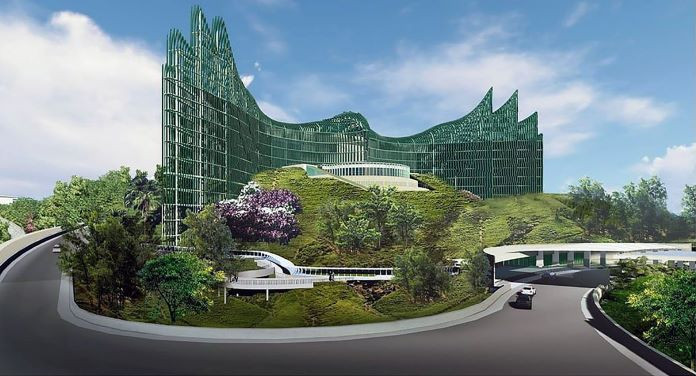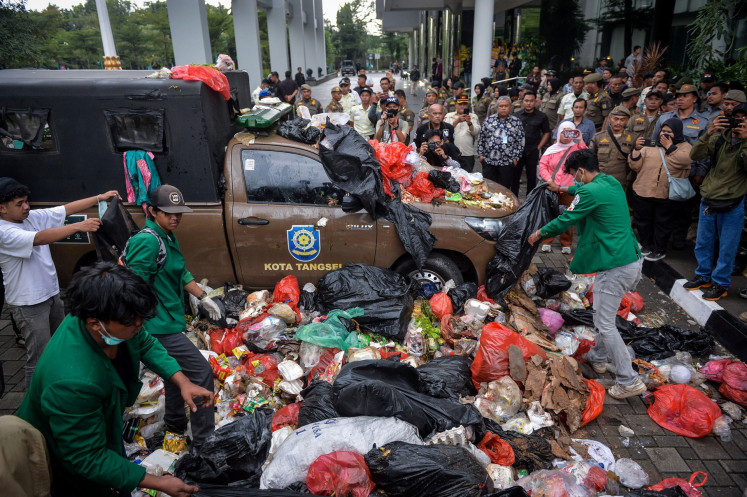Popular Reads
Top Results
Can't find what you're looking for?
View all search resultsPopular Reads
Top Results
Can't find what you're looking for?
View all search resultsNew capital: A giant’s baby steps
The government needs to find a way to reassure investors that the capital relocation will move ahead and not slow down regardless of who wins the election.
Change text size
Gift Premium Articles
to Anyone
T
he government is putting on a brave face as its time frame for the establishment of a new capital city, to be called Nusantara, looks increasingly challenged by realities on the ground.
Letters of intent (LoIs) from domestic and foreign investors are piling up at the authority in charge of the megaproject, the IKN Authority.
IKN Authority chairman Bambang Susantono told lawmakers earlier this month that the number of “serious” LoIs had reached 90, which is 17 more than the figure he had mentioned at the World Economic Forum some two weeks prior.
Clearly, there is interest both at home and abroad, but intentions alone will not build anything, let alone a brand-new city from scratch in eastern Kalimantan. They are necessary but not sufficient.
This became painfully clear with the pull-out of SoftBank Group in March last year. The Japanese investment giant had reportedly been looking to commit US$30 billion to $40 billion to get the project rolling. Its sudden exit had government officials scratching their heads over who could replace it.
Three factors of uncertainty are keeping investors on the sidelines for now.
The most immediate is uncertainty about the upcoming presidential election. Indonesia’s current political system seems robust enough despite its young age, but potential IKN investors will want to know whether a successor to President Joko “Jokowi” Widodo will be just as committed to the project as the incumbent.
The second factor is organizational readiness, with some potential investors complaining of difficulty connecting with the IKN Authority. IKN Authority deputy head Dhony Rahajoe noted the need to strengthen the authority’s institutional role and its capacity. “If there is strong support and we have a professional team, we will be successful, but if support is weak and our staff are not ready, the project could stall,” Dhony told lawmakers on Feb. 6, stressing the need for capacity-building and “top talent”.
The third factor is a collective action problem of sorts. Potential investors like to see traction in a project before they get involved, but unless some take the plunge, that traction will not come about.
None of these factors negate the fact that the project, on the face of it, is an enticing proposition. Unlike China, where some megaprojects have ended up as ghost cities because of excess housing for a stagnating population, Indonesia needs more housing to accommodate a growing population.
Furthermore, due to its political function, the capital city of Nusantara will automatically generate demand for offices and housing, and by extension for everything else. And it will take place in the macro context of an aspiring emerging economy placed in a fast-growing region of the world.
Yet, private-sector actors will not be pushed into the project. Rather, they will wait and see, for as long as nothing is happening there, they are not missing out. The government, therefore, needs to address each of the three aforementioned factors.
It needs to find a way to reassure investors that the megaproject will move ahead and not slow down regardless of who wins the election. If statements to that effect are not convincing enough, specific financial guarantees might be an option, depending on the type of investment in question.
The IKN Authority must be vested with the powers to make authoritative decisions and be staffed with the manpower it needs to organize itself professionally, to communicate procedures clearly and to implement them transparently. Good governance in selection processes and project appointment is crucial.
Finally, to provide the initial impetus necessary for drawing in more investors, the government might assign state-owned enterprises to do more of the heavy lifting, funded by increased budget spending. This would communicate to private-sector actors that the government itself believes in Nusantara’s long-term viability.
Assuming that the electoral and administrative issues are solved, that early traction would prepare the ground for commercial engagement. These are baby steps, but everything begins with baby steps, even the walk of a giant.
Your Opinion Matters
Share your experiences, suggestions, and any issues you've encountered on The Jakarta Post. We're here to listen.
Thank you
Thank you for sharing your thoughts. We appreciate your feedback.











